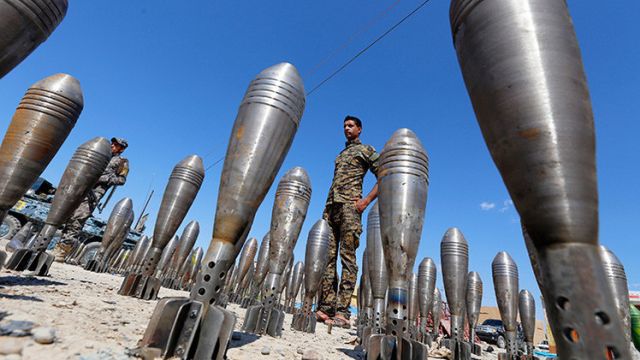
by Editor | May 25, 2021 | Muslim World
 Kuwait City : The upcoming Kuwait International Conference for the Reconstruction of Iraq (KICRI) will provide lucrative investment opportunities for participating companies, a Kuwaiti official said on Sunday.
Kuwait City : The upcoming Kuwait International Conference for the Reconstruction of Iraq (KICRI) will provide lucrative investment opportunities for participating companies, a Kuwaiti official said on Sunday.
“I am confident that different companies will be assured of what Iraq has to offer in terms of investment opportunities, a matter that would be of great return on Iraq, its stability, as well as benefiting its people,” Mohammad Abulhassan, head of the higher media committee of KICRI and Amiri Diwan Advisor, said.
He emphasised on potential projects, as well as the involvement of the Iraqi government in future ventures, in cooperation with public benefit societies and Kuwaiti charitable organisations, Xinhua reported.
Secretary General of the Iraqi Cabinet Mahdi Al-Allaq said that his country is a “promising” one, with huge potentials in terms of financial and human resources, as well as a sound investment environment.
The three-day KICRI is due to kick off on Monday, which will bring together several economically powerful countries, as well as regional and international organizations on contributions to rebuild Iraq after many years of war and conflicts.
—IANS

by Editor | May 25, 2021 | Muslim World
 Washington : The World Bank on Tuesday approved $400 million in additional funding to help rebuild services to Iraqi areas recaptured from Islamic State (IS) militants after a three-year military campaign, the global development bank said.
Washington : The World Bank on Tuesday approved $400 million in additional funding to help rebuild services to Iraqi areas recaptured from Islamic State (IS) militants after a three-year military campaign, the global development bank said.
The World Bank also said it would fund studies on how to involve the private sector in the reconstruction of Mosul’s airport and restore public transport terminals as well as parts of the railway network, Reuters reported.
“The package represents an additional financing to the Iraq Emergency Operation for Development Project [$350 million] approved back in July 2015 and already underway in seven cities in Diyala and Salah Ad-Din governorates,” the World Bank said in a statement.
It said the new funding would focus on rebuilding in five sectors – water and sanitation, electricity, health, transport and municipal services. The funds will also help with the restoration and preservation of cultural heritage sites in Mosul’s Old City, which was heavily damaged in fighting.
Iraqi government forces, backed by a US-led coalition, retook Mosul in May – by far the largest city to fall under militants’ control – after nearly nine months of urban warfare. Iraqi government officials have estimated it will take at least five years and billions of dollars to rebuild Mosul.
—AB/OIC-UNA

by Editor | May 25, 2021 | Commodities, Commodities News, Muslim World
 Baghdad : The Iraqi Oil Ministry on Sunday announced it has increased the capacity to export oil from the southern port of Basra to 4.6 million barrels per day (bpd) after building a new floating terminal.
Baghdad : The Iraqi Oil Ministry on Sunday announced it has increased the capacity to export oil from the southern port of Basra to 4.6 million barrels per day (bpd) after building a new floating terminal.
“The increase in export capacity to unprecedented levels was achieved after the completion of the fifth floating terminal, which added a new export capacity of 900,000 bpd,” Iraqi Oil Minister Jabbar Luaybi said in a statement, Xinhua reported.
According to him, “the oil exports capacity means that Iraq has the ability to export 4.6 million bpd, not necessary to mean that Iraq will export such quantities of oil”.
Iraq had plans to build five single-point mooring (SPM) with an export capacity of 850,000 to 900,000 bpd in an attempt to increase oil exports through the oil-hub of Basra.
The new terminal is one of five floating terminals with similar oil capacity the Iraqi oil ministry has been building to increase its oil export capacity via Basra port to more than 5 million bpd.
Iraq’s oil exports average was about 3.13 million bpd in the first 22 days of October from Basra. The country depends on oil revenues for nearly 95 percent of its budget.
In 2010, Iraq announced its proven oil reserves had increased to 143.1 billion barrels from the previous estimation of 115 billion barrels.
—IANS

by Editor | May 25, 2021 | Opinions
 By Rajendra Shende,
By Rajendra Shende,
Mandated by the UN, the coalition forces invaded Iraq in 2003 to destroy its “chemicial weapons of mass destruction” without finding a smoking gun. That’s the negative. There’s also been a positive.
Thirty years ago, member-states of the UN reached amazing consensus, without any sign of a smoking gun, and sealed a deal to take daring action. To dramatise the story, 24 countries on that day decided to start destroying what could be called “chemical weapons of mass destruction” that were being emitted, albeit unintentionally, in millions of tonnes annually and getting “stocked” in the sky. Those groups of chemicals were called ozone-depleting substances, mainly chlorofluorocarbons (CFCs), which were predicted to be the cause of the destruction of the Earth’s defence system — the stratospheric ozone layer.
When the final negotiations under the umbrella of the UN Environment Programme ended on September 16, 1987, with a historic agreement called “The Montreal Protocol on Substances that Deplete the Ozone Layer”, there was no smoking gun evidence that CFCs were the cause of the global depletion of the ozone layer. The ozone hole — loss of more than 50 per cent (and even 95 per cent in places) of the ozone — was observed over Antarctica’s stratosphere when the negotiations were taking place, but scientists could not firmly implicate CFCs for it in a conclusive manner. The evidence of the predicted impact on life on Earth was even farther and nowhere visible. The only push came from scientists who theorised the destruction of the ozone layer and the study reports from more than a decade of research after the proposed hypothesis was first made.
Delegates, however, agreed not to give a cynical shrug to the lack of specific attribution and causation. They no longer demanded a smoking gun. They decided to begin action to eliminate production and consumption of CFCs.
The Montreal Protocol proved to be a historic first step. Sealing that one deal began the journey of the most successful multilateral agreement in the annals of not only global environmental accords but for any UN global accord. It gave birth to the concept of the “precautionary principle” which was the seminal theme of the Agenda 21 that the world leaders agreed on five years later, in June 1992, in Rio de Janeiro.
It signalled an approach that necessarily requires action to control inputs of such substances and happenings even before a causal link has been established by absolutely clear scientific evidence.
The story is nothing short of extraordinary. It started with the concurrent publication of two scientific papers in two American universities — one by Richard Stolarsky and Ralph Cicerone of the University of Michigan, and other by Mario Molina and Sherwood Rowland of the University of California-Berkeley. Extraordinary, because a scientific paper is rarely the subject of discussion in the buzzing corridors and glittering halls of the UN.
Second, the papers theorised a postulation, based on the not-so-simple chemistry taking place high up in the sky. Specifically, the papers stated that CFCs being exceptionally stable, once released into the atmosphere, can transgress to the stratosphere 15 km above the Earth. They would then have been decomposed by high-energy solar UV rays and would release chlorine atoms that could eliminate ozone molecules existing in the rarefied concentration of one in a million other molecules.
That would trigger the dangerous loss of ozone in the stratosphere, because each chlorine atom could destroy hundreds and thousands of ozone molecules which form the ozone shield that protects life on the earth. That was a shocking hypothesis, almost like a gunshot fired at close range. UN delegates, used to dealing with conflicts on the ground, could hardly be expected to take note of such a postulation, leave alone take action to eliminate causative reasons.
Subsequent worldwide collaborative scientific study did find the smoking gun within months of the Montreal Protocol’s signing.
Scientists like Susan Solomon of NOAA (now MIT) were able to solve the jigsaw puzzle of chlorine and other species observed over Antarctica by linking them to very low temperature catalytic reactions accelerated by the ice crystals of the polar stratospheric cloud.
The Montreal Protocol has since succeeded in phasing out 98 per cent of the ozone-depleting chemicals, including nearly 100 per cent of CFCs. But more importantly, it phased-in the important precautionary principal lesson in the history books of the UN’s multilateral environmental agreements. Last month’s observations of the ozone layer over Antarctica by NASA records definite slowing of its depletion and better recovery than last year — rare success that exemplifies the positive results of UN efforts and collective global action.
Two years ago, world leaders adopted the Sustainable Development Goals — SDGs — a collective action for a better world by 2030. This agenda carries forward the seminal principle of the precautionary approach.
(Rajendra Shende, an IIT alumnus, is Chairman TERRE Policy Centre and a former UNEP Director. The views expressed are personal. He can be contacted at shende.rajendra@gmail.com)
—IANS

by Editor | May 25, 2021 | Muslim World
 Tehran : Iran has banned the transportation of crude oil products to and from Iraq’s Kurdistan region, the authorities said on Saturday.
Tehran : Iran has banned the transportation of crude oil products to and from Iraq’s Kurdistan region, the authorities said on Saturday.
With reference to recent developments in the region, the international and local transportation companies are banned from loading crude products to and from Iraqi Kurdistan by the next notice, reported Xinhua news agency.
Any disregard of the notice will have consequences to the transportation agency, it said.
Iran has already closed its airspace to the flight commuting between Iraqi Kurdistan region and the country.
Iran, Turkey, Iraq and the US have rejected the results of referendum in the Kurdish region, which voted for independence on September 25.
—IANS

 Kuwait City : The upcoming Kuwait International Conference for the Reconstruction of Iraq (KICRI) will provide lucrative investment opportunities for participating companies, a Kuwaiti official said on Sunday.
Kuwait City : The upcoming Kuwait International Conference for the Reconstruction of Iraq (KICRI) will provide lucrative investment opportunities for participating companies, a Kuwaiti official said on Sunday.



